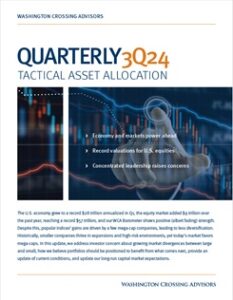A Warning Over Speculative Debt
Last week, the European Central Bank (ECB) raised a red flag, saying some member banks have ignored warnings of risks associated with leveraged finance, according to Bloomberg News. The ECB hit a handful of European banks with capital charges in an attempt to encourage the banks to exercise greater caution. These actions come amid growing concern in Europe over a looming energy crisis, ongoing war in Ukraine, and struggles at some financial institutions. These pressures are evident in both confidence indicators like business confidence (graph A, below) and measures of financial stress (graph B, below).
Graph A
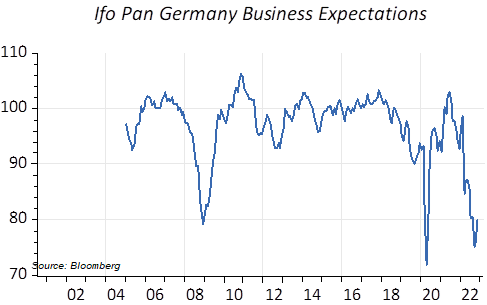
Graph B
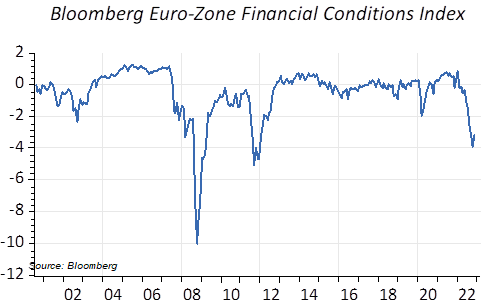
Rise of Leveraged Finance
Leveraged finance is the use of high amounts of debt, instead of equity, to purchase assets. This type of financing often aims to increase an investment’s potential return. An underlying assumption is that the investment increases in value faster than the cost of financing the investment. As interest rates rise and the economy slows, greater attention is likely to be paid to such arrangements. The Federal Reserve and other U.S. agencies have warned of risks associated with rapid growth of leveraged loans, especially those originated by hedge funds and others outside the traditional banking system.
An extended period of low rates, low volatility, and risk appetite drove a global hunt for yield, and easy monetary policies encouraged heavy borrowing. Private equity and leveraged buyout activity hypercharged growth, resulting in more leverage and less bondholder protection. According to Moody’s, leveraged finance is now $4 in size globally, with $1.5 trillion borrowed in 2021 alone.
Now, central banks around the world are pulling back support. Facing high inflation, they are raising short-term interest rates and reducing programs that previously supported market liquidity. Since leveraged loans feature floating interest rates, recent increases in short-term interest rates, in combination with a potential slowdown in earnings growth posed by the less favorable economic outlook, could pressure credit quality of highly indebted companies. In effect, central banks are looking to manage risks in leveraged finance now that they have removed the “punch bowl,” and toughening financial conditions potentially lie ahead.
Why Care?
We care about debt and leverage because they can amplify volatility. When a company or economy with high debt experiences a downturn or increase in borrowing costs, both of which are in the cards today, crisis and failure can easily follow. When debt burdens are lower, the business’s and economy’s periodic ups and downs are less life-threatening. Over the past decade, global debt increased by about 4.6% annually while the global economy grew an average of 2.7% per year, including inflation (graph C, below). Leveraged loans to lower-quality borrowers in the United States rose even faster, at a 12.2% pace, according to the Federal Reserve. The result was a rise in total global debt to nearly $150 trillion, about 50% more than the entire planet’s annual output (graph D, below). The potential for greater volatility, more shocks, and a rolling crisis is significant if debt continues to grow faster than the economy.
Graph C
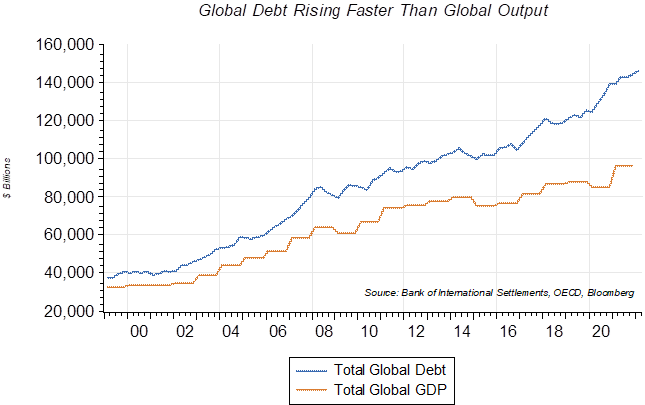
Graph D
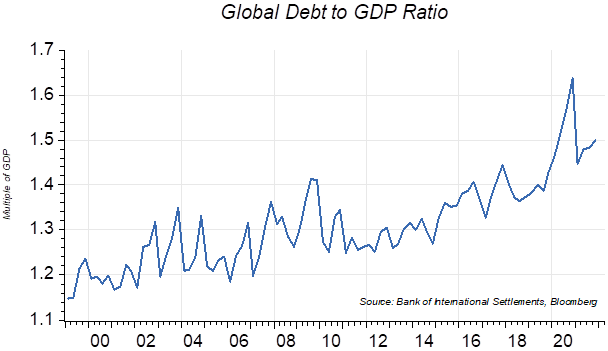
Conclusion
It is increasingly important to focus on quality in a world of growing debt burdens. Should the months bring lower earnings and higher funding costs, higher-quality companies with less debt should perform better than lower-quality, highly indebted companies. Companies with greater flexibility, predictability, and durability make sense in such an environment. Therefore, our focus on asset profitability, lean balance sheets, and steady businesses will remain foremost in our minds.
Disclosures:
The Washington Crossing Advisors’ High Quality Index and Low Quality Index are objective, quantitative measures designed to identify quality in the top 1,000 U.S. companies. Ranked by fundamental factors, WCA grades companies from “A” (top quintile) to “F” (bottom quintile). Factors include debt relative to equity, asset profitability, and consistency in performance. Companies with lower debt, higher profitability, and greater consistency earn higher grades. These indices are reconstituted annually and rebalanced daily. For informational purposes only, and WCA Quality Grade indices do not reflect the performance of any WCA investment strategy.
Standard & Poor’s 500 Index (S&P 500) is a capitalization-weighted index that is generally considered representative of the U.S. large capitalization market.
The S&P 500 Equal Weight Index is the equal-weight version of the widely regarded Standard & Poor’s 500 Index, which is generally considered representative of the U.S. large capitalization market. The index has the same constituents as the capitalization-weighted S&P 500, but each company in the index is allocated a fixed weight of 0.20% at each quarterly rebalancing.
The information contained herein has been prepared from sources believed to be reliable but is not guaranteed by us and is not a complete summary or statement of all available data, nor is it considered an offer to buy or sell any securities referred to herein. Opinions expressed are subject to change without notice and do not take into account the particular investment objectives, financial situation, or needs of individual investors. There is no guarantee that the figures or opinions forecast in this report will be realized or achieved. Employees of Stifel, Nicolaus & Company, Incorporated or its affiliates may, at times, release written or oral commentary, technical analysis, or trading strategies that differ from the opinions expressed within. Past performance is no guarantee of future results. Indices are unmanaged, and you cannot invest directly in an index.
Asset allocation and diversification do not ensure a profit and may not protect against loss. There are special considerations associated with international investing, including the risk of currency fluctuations and political and economic events. Changes in market conditions or a company’s financial condition may impact a company’s ability to continue to pay dividends, and companies may also choose to discontinue dividend payments. Investing in emerging markets may involve greater risk and volatility than investing in more developed countries. Due to their narrow focus, sector-based investments typically exhibit greater volatility. Small-company stocks are typically more volatile and carry additional risks since smaller companies generally are not as well established as larger companies. Property values can fall due to environmental, economic, or other reasons, and changes in interest rates can negatively impact the performance of real estate companies. When investing in bonds, it is important to note that as interest rates rise, bond prices will fall. High-yield bonds have greater credit risk than higher-quality bonds. Bond laddering does not assure a profit or protect against loss in a declining market. The risk of loss in trading commodities and futures can be substantial. You should therefore carefully consider whether such trading is suitable for you in light of your financial condition. The high degree of leverage that is often obtainable in commodity trading can work against you as well as for you. The use of leverage can lead to large losses as well as gains. Changes in market conditions or a company’s financial condition may impact a company’s ability to continue to pay dividends, and companies may also choose to discontinue dividend payments.
All investments involve risk, including loss of principal, and there is no guarantee that investment objectives will be met. It is important to review your investment objectives, risk tolerance, and liquidity needs before choosing an investment style or manager. Equity investments are subject generally to market, market sector, market liquidity, issuer, and investment style risks, among other factors to varying degrees. Fixed Income investments are subject to market, market liquidity, issuer, investment style, interest rate, credit quality, and call risks, among other factors to varying degrees.
This commentary often expresses opinions about the direction of market, investment sector, and other trends. The opinions should not be considered predictions of future results. The information contained in this report is based on sources believed to be reliable, but is not guaranteed and not necessarily complete.
The securities discussed in this material were selected due to recent changes in the strategies. This selection criterion is not based on any measurement of performance of the underlying security.
Washington Crossing Advisors, LLC is a wholly-owned subsidiary and affiliated SEC Registered Investment Adviser of Stifel Financial Corp (NYSE: SF). Registration with the SEC implies no level of sophistication in investment management.

